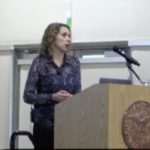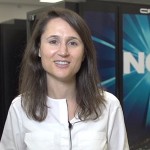The Massive Storage Systems and Technology Conference (MSST) posted their preliminary speaker agenda. Keynote speakers include Margo Seltzer and Mark Kryder, along with a five-day agenda of invited and peer research talks and tutorials, May 20-24 in Santa Clara, California. “MSST 2019 will focus on current challenges and future trends in distributed storage system technologies,” said Meghan Wingate McClelland, Communications Chair of MSST.”
Kimberly Keeton from HPE Presents: Memory-Driven Computing
Kimberly Keeton from HPE gave this talk at the MSST Conference. “Data growth and data analytics requirements are outpacing the compute and storage technologies that have provided the foundation of processor-driven architectures for the last five decades. This divergence requires a deep rethinking of how we build systems, and points towards a memory-driven architecture, where memory is the key resource and everything else, including processing, revolves around it.
Radio Free HPC Previews the MSST Mass Storage Conference
In this podcast, the Radio Free HPC team discusses the upcoming MSST Mass Storage Conference with Program Chair Matthew O’Keefe from Oracle. “Since the conference was founded by the leading national laboratories, MSST has been a venue for massive-scale storage system designers and implementers, storage architects, researchers, and vendors to share best practices and discuss building and securing the world’s largest storage systems for HPC, web-scale systems, and enterprises.”
A Perspective on Power Management for Hard Disks
Kirill Malkin from SGI presented this talk at the 2016 MSST conference. “Malkin will talk about the impact of power management on reliability of hard disk devices based on a field experience with SGI’s MAID product (formerly COPAN). The presentation will explore statistical analysis of support data covering a decade of MAID deployment (2005-2015) as well as briefly cover the history and basic principles of the technology and provide an update on future direction of the product line.”
Superfacility – How New Workflows in the DOE Office of Science are Changing Storage Requirements
Katie Antypas from NERSC presented this talk at the 2016 MSST conference. Katie is the Project Lead for the NERSC-8 system procurement, a project to deploy NERSC’s next generation supercomputer in mid-2016. The system, named Cori, (after Nobel Laureate Gerty Cori) will be a Cray XC system featuring 9300 Intel Knights Landing processors. The Knights Landing processors will have over 60 cores with 4 hardware threads each and a 512 bit vector unit width. It will be crucial that users can exploit both thread and SIMD vectorization to achieve high performance on Cori.”
Video: A Journey to a Holistic Framework for Data-intensive Workflows at CSIRO
In this video from the 2016 MSST Conference, Ian Corner from CSIRO in Australia presents: A Journey to a Holistic Framework for Data-intensive Workflows. “At CSIRO, we are Australia’s national science organization and one of the largest and most diverse scientific research organizations in the world. Our research focuses on the biggest challenges facing the nation. We also manage national research infrastructure and collections.”
Video: DSSD Scalable High Performance FLASH Systems
Jeff Bonwick from EMC DSSD presented this talk at the MSST conference. “Jeff Bonwick is co-founder and CTO of DSSD, where he co-invented both the system hardware architecture and the Flood software stack. His talk will focus on extracting maximum performance from flash at scale. Jeff has a long history of developing at-scale storage starting with leading the team that developed the ZFS filesystem, which powers Oracle’s ZFS storage line as well as numerous startups including Nexenta, Delphix, Joyent, and Datto.”
Interview: Jeff Bonwick on the Secret Sauce behind DSSD
We caught up Jeff Bonwick from DSSD to learn more about their exciting storage technology for HPC. “Our mission statement was four words: fastest storage on earth. That was our singular goal from day one, which gave the team incredible focus and clarity. Whenever we had to make a tradeoff between performance and something else, performance always won. Always. And it just so happens that when you aim for performance, density comes along for the ride because the more flash chips you have working in parallel, the faster it goes.”
Interview: Moving Beyond POSIX with the new MarFS Object Storage Project
“We wanted to get away from the complexity of POSIX for data, yet retain the parts of POSIX that people are used to (metadata manipulation). By divorcing ourselves from the complications of ensuring a completely POSIX data flow, we can massively simplify the data movement and storage mechanisms. MarFS lets us retain the parts of POSIX that users appreciate for data management (chown, chmod, rename, mv, etc) without inheriting the complexity of managing POSIX semantics for data manipulation. By treating the data as essentially immutable, we can leverage the very simple PUT/GET/DELETE semantics of “cloudy” data storage systems to scale out storage with ease.”
Henry Newman on Why Workloads Matter More Than IOPS
Over at Enterprise Storage Forum, Henry Newman looks at why we should focus on how much work gets done rather than specifications as disk drives and SSDs get faster and faster. This is not a new rant for Henry, and in fact the importance of workflow over bandwidth or IOPs is the main theme at this year’s Mass Storage Systems and Technology Conference (MSST) coming up in May.












